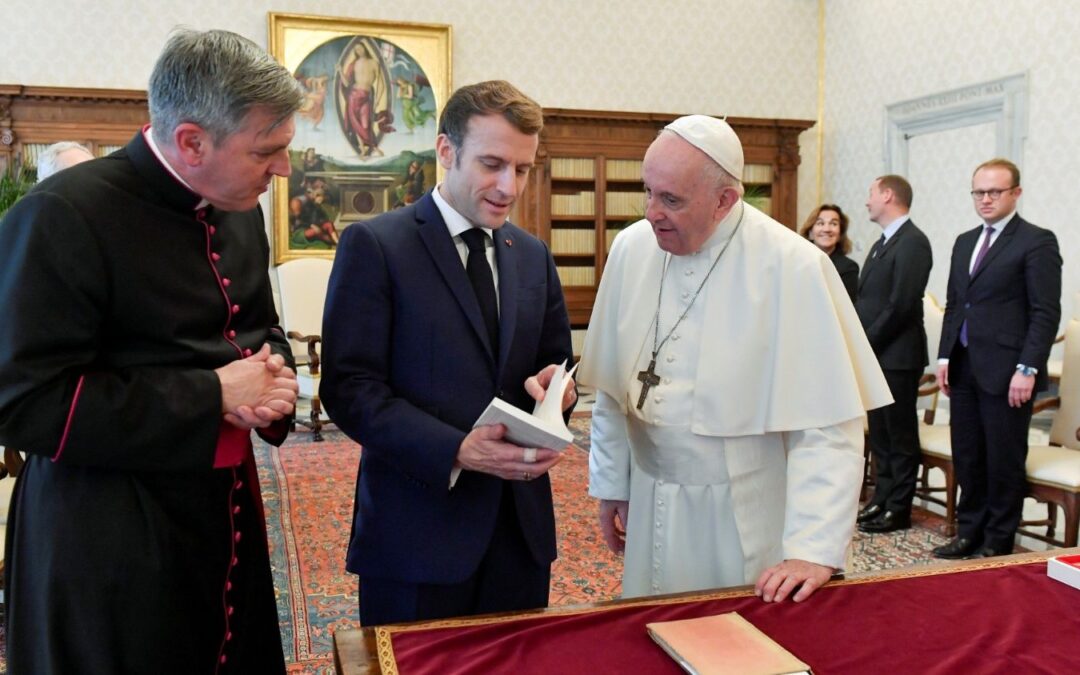This article has been updated to include quotes from the person who sold the book in question and says that it was not looted property.
Questions have been raised in Poland after French President Emmanuel Macron gifted Pope Francis an antique book that, it later transpired, was stamped with the name of a former Polish academic society.
Some have wondered if the item was among the hundreds of thousands of cultural artefacts looted from Poland during the Nazi German and Soviet occupations of World War Two. One commentator accused Macron of “dealing in stolen goods”.
Macron and Francis met in the Vatican yesterday, with their hour-long talk focused on Russia’s war in Ukraine. During the meeting, the French president gifted the pope a French first edition of German philosopher Immanuel Kant’s Perpetual Peace, published in Königsberg (now the Russian city of Kaliningrad) in 1796.
Later, an image from inside the book was posted on Twitter by Loup Besmond de Senneville, the Vatican correspondent of La Croix, a French Catholic newspaper.
Polish internet users quickly pointed out that the volume bore a stamp saying, in Polish, “Academic Reading Room in Lwów”. Lwów is the Polish name of the city of Lviv, which is now in Ukraine but before World War Two was part of Poland.
According to Interactive Lviv, an online historical project about the city, the Academic Reading Room was a Polish student society that operated from 1867 until 1939.
This photo has created quite a stir in Poland – the stamp clearly indicates that the book presented by the French President to Pope Francis used to be the property of the (then) Polish university library in Lviv…Embarrassing to say the least…👇 https://t.co/mowVIyn46t
— Robert Pszczel (@RobertPszczel) October 24, 2022
Questions immediately began to be raised as to how the item came to belong to France, with many Polish right-wing commentators suggesting it could have been looted. Lviv was occupied by the Soviets in 1939, then by Nazi Germany in 1941, before falling back into Soviet hands in 1944.
“Either the Germans, the Russians, or one of the French Waffen-SS units stole this work,” tweeted Stanisław Janecki, a commentator for conservative news outlets Sieci and wPolityce. “Congratulations to President Macron for dealing in stolen goods.”
“How to spit in the face of Poles with exceptional talent,” wrote another right-wing journalist, Piotr Semka, alongside an image of the books.
The case requires verification. The book could have been exchanged before WW2 (as a duplicate), for another book from the collection of some other library. However, the Germans were massively plundering Polish libraries/archives, so this is still the most likely source of origin.
— Sławomir Dębski (@SlawomirDebski) October 24, 2022
However, Sławomir Dębski – head of government-linked think tank the Polish Institute of International Affairs (PISM) – called for more research before jumping to conclusions.
“The book could have been exchanged before WW2 (as a duplicate), for another book from the collection of some other library,” he noted. “However, the Germans were massively plundering Polish libraries/archives, so this is still the most likely source of origin.”
Swiss investigative journalist Arnaud Bédat found evidence that he said shows the book gifted to Pope Francis had already belonged to a bookseller in Paris around 1900 and was also more recently sold for €2,500.
Selon la fiche descriptive de la librairie Hatchuel, cet exemplaire était depuis bien longtemps déjà en France. Il est passé notamment chez le libraire Lucien Bodin à Paris, quai des Grands-Augustins (une étiquette en atteste sur le contre-plat) aux environs des années 1900… pic.twitter.com/daQS3j0VFC
— Arnaud Bédat (@ArnaudBedat) October 24, 2022
Subsequently, the bookseller in question, Patrick Hatchuel, told Agence France-Presse that he was certain the book was not looted. He confirmed that it came to Paris around 1900 and its most recent provenance was a sale to a private collector half a century ago, whose son then sold it to Hatchuel.
The bookseller confirmed that he had sold it on to Macron’s office for less than the catalogue price of €2,500. He also noted that the Polish government had contacted him about the origin of the book.
Earlier, in response to a social media user asking the Polish government for a response to the issue, the foreign ministry’s spokesman, Łukasz Jasina, had written that “we are aware of the case”.
Pourquoi un livre offert par Macron au pape François déclenche la polémique en Pologne https://t.co/GdyXJASO2L
— Europe 1 🎧🌍📻 (@Europe1) October 25, 2022
Jan Filip Libicki, a senator for the opposition Polish People’s Party (PSL), also commented, saying that there were two possibilities behind Macron’s decision to gift the book. The first was that it was an accident, although Libicki said it would have required unusual “thoughtlessness” from Macron’s staff to allow that to happen.
“The second option is that it has some specific intention,” said Libicki, speaking to state broadcaster TVP. “If so, I don’t know what it was, but certainly not a positive one.”
“I think it would be nice if the Holy See made some kind of gesture on this issue, for example maybe passing on this gift to a Polish official in the Vatican, or to the Metropolitan of Lviv,” he added.
Ten prezent dla Papieża wywołał burzę. Libicki: Trudno sobie wyobrazić, byśmy mieli do czynienia z bezmyślnością. Więcej na https://t.co/elwAa96aXC #NiezaleznaPL https://t.co/zXAo67ne0f
— Niezalezna.PL (@niezaleznapl) October 25, 2022
The question of looted goods is an extremely sensitive one in Poland. During the war, hundreds of thousands of works of art and other cultural items were stolen, with a large proportion of them still missing.
The government has made efforts to secure their return, including last month launching a new campaign – called “Empty Frames” – seeking the return of looted art.
Main image credit: Vatican handout

Daniel Tilles is editor-in-chief of Notes from Poland. He has written on Polish affairs for a wide range of publications, including Foreign Policy, POLITICO Europe, EUobserver and Dziennik Gazeta Prawna.




















